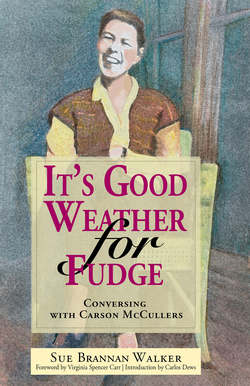Читать книгу It's Good Weather for Fudge - Sue Brannan Walker - Страница 10
На сайте Литреса книга снята с продажи.
ОглавлениеForeword (2007)
Virginia Spencer Carr (1929–2012)
I first met Sue Walker, the author of It’s Good Weather for Fudge: Conversing with Carson McCullers, when she and her husband visited me (with their twins in a stroller) more than a quarter of a century ago in Columbus, Georgia, and we have kept up with each other ever since. Sue was immersed in the writings of Carson McCullers for her Ph.D. dissertation, just as I had been in 1967 when I knew at once upon hearing of McCullers’s death at the age of fifty that she would be the subject of my own intensive study and dissertation, which I titled “Carson McCullers and the Search for Meaning.” McCullers’s search was mine, just as it became Sue’s, too.
A Brookstone School student in McCullers’s hometown, where I was living and teaching, said to me shortly after publication of The Lonely Hunter: A Biography of Carson McCullers (Doubleday, 1975): “I can’t believe that you took seven years out of your life to write this book.” I replied, smiling: “Those seven years were my life, and I thank God for them.”
So, too, was Sue Walker’s life enhanced and unalterably changed by her encounter and prolonged love affair—what else can I call it?—with McCullers, during which time Sue became a first-rate poet, teacher, and founder/editor of an important poetry journal. Although different, indeed, from McCullers’s poetry, Sue’s own poem, “It’s Good Weather for Fudge,” is reminiscent of her mentor’s “The Dual Angel: A Meditation on Origin and Choice,” a poem that influenced Sue’s writing as well as my own.
It’s Good Weather for Fudge: Conversing with Carson McCullers is, in a sense, Sue’s memoir, an entwining of McCullers’s life with Sue’s own growing-up years in Foley, Alabama. To read her poem is to revisit McCullers and the remarkable characters who course through everything she wrote, and to intuit that “It’s Good Weather for Fudge” reveals with delicious subtlety and humor something of the poet’s own extraordinary life.
Early in the poem, Sue writes:
The places of our childhood
mold who we are and stick
in our memories as if we had a glue pot
and had pasted them inside
the scrapbook of our brains.
We both attended the First Baptist Church,
got baptized and wondered
why there wasn’t within us
immediate transformation and change.
. . . You shouldn’t be laid to your eternal
rest up in New York in an alien graveyard,
and you already are resurrected,
so to speak. Every time somebody
buys The Member of the Wedding
or checks it out of the library,
your words live. Berenice Sadie Brown’s
created world and that of Frankie
Addams and little John Henry
are more lasting than bones,
and I want to join in and say
what I would do
if I could rearrange things
according to my liking.
Reading Sue Walker’s book is an intense and touching revisiting of each of McCullers’s books. Not only do the fictional characters depicted take on new life, but so, too, do McCullers’s friends—those who knew her personally, of course, and those who knew her only through her novels, short stories, poems, nonfiction, and letters to dear ones—most of them now deceased—yet were changed personally, our very beings enhanced, because she came into our lives.
Thank you, Carson.
Thank you, Sue.
